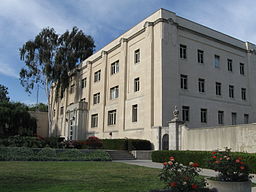Detailed workshop arrangements
Getting to and from the workshop
Please log in to the right (or below if you are on a mobile device) to see information like phone numbers!

The workshop will be held in Room 387 on the third floor of the Ronald and Maxine Linde Hall of Mathematics and Physics (formerly the Sloan Laboratory), which is building 37 on the Caltech campus map. The closest convenient drop off point is the Arms Circle (1201 E. California Blvd., Pasadena, CA 91125). Walk east on California Blvd. When you see the pedestrian crossing turn left/north, away from the crossing; Linde Hall will be in front, to your right, up a few steps (see photo).

Wilson and San Pasqual is another option for drop off. This is one of the stops from which SuperShuttle offers a discounted service to local airports. A mushroom-shaped campus map is located just east of the intersection. Walk into campus via Bechtel Mall, which is the entrance between the two distinctive turquoise domes. Linde Hall will be on the right, past the Millikan Library (the tall '60s style tower), and just before the 'Turtle Pond'.
If you are driving to campus, the California Parking (Structure 3) is the most convenient for the Linde Hall building; the entrance to this underground parking is at the southern end of the structure, just before the Brown Gym. Cross the street (California Blvd.) at the lights, and Linde Hall will be in front, to your right, up a few steps. Alternatively use the South Wilson Parking Structure (Structure 2 on the Interactive Parking Map) and follow directions from the Wilson and San Pasqual intersection.
If you live in the Los Angeles area, or are driving from elsewhere, we can arrange a parking permit for you. You can park in the Arms Circle for up to 15 mins to come into the Arms Laboratory, and pick up the first day's permit; then repark in one of the parking structures. Permits for subsequent days will be available at the workshop.
Computing
Please log in to the right (or below if you are on a mobile device) to see information like phone numbers!
Each workshop attendee will need to bring a laptop. There will be power sockets available for all. Wi-Fi connection details will be added nearer the time.
Schedule
- 10th July 2019: Workshop full day
- 9.00 AM: Welcome to the workshop (logistics); brief overview of MELTS software programs that we will be using and how to install them
- 9.30 AM: Talk on model construction for the MELTS family of algorithms; modeling modeling magma chamber processes, including liquid lines of descent (LLD), assimilation and fractional crystallization (AFC)
- 10.30 AM: Coffee break (exact time TBD; software installation clinic)
- 11.00 AM: Practical session, getting started with alphaMELTS 2; brief introduction to other interfaces (e.g. Rhyolite-MELTS graphical user interface, MELTS for Excel), how to generate input files, and plot results.
- 12.30 PM: Lunch, e-mail break etc. (exact time TBD)
- 1.30 PM: Practical session, modeling magma chamber processes with alphaMELTS 2
- 3.00 PM: Refreshments served (exact time TBD)
- 3.30 PM: Continued from previous session, modeling magma chamber processes with alphaMELTS 2
- 5.00 PM: End of afternoon session
- 11th July 2019: Workshop full day
- 9.00 AM: Introduction to alphaMELTS for MATLAB/Python*
- 10.30 AM: Coffee break (exact time TBD)
- 11.00 AM: Practical session, using alphaMELTS for MATLAB to model magma chamber processes; assimilation and other (user-defined) open-system behavior
- 12.30 PM: Lunch, e-mail break etc. (exact time TBD)
- 1.30 PM: Parallel computing with MATLAB, for alphaMELTS and other applications; improving performance, and supporting large scale computing (with MATLAB visitor Sumit Tandon)
- 3.00 PM: Refreshments served (exact time TBD)
- 3.30 PM: Practical session, more examples using alphaMELTS for MATLAB to automate calculations, e.g. to quickly generate phase diagrams and PT-grids
- 5.00 PM: End of afternoon session
- 12th July 2019: Workshop half day, with optional afternoon session
- 9.00 AM: Talk and melting using the MELTS family of algorithms; demonstration of new trace element engine in alphaMELTS 2; introduction to pHMELTS model, including the effect of storage of water in nominally anhydous minerals (NAM), and flux melting.
- 10.30 AM: Coffee break (exact time TBD)
- 11.00 AM: Practical session, modeling melting using the alphaMELTS 2 interface, followed by a brief introduction to ENKI and the tools hosted there; discussion of how alphaMELTS and other MAGMA@Caltech tools fit in with the ENKI project.
- 12.30 PM: Lunch, e-mail break etc. (exact time TBD)
- 1.30 PM: Work through problems suggested by participants. Possibility to break out into smaller groups with common interests or to work individually with instructors.
- 3.00 PM: Refreshments served (exact time TBD)
- 3.30 PM: Continued from previous session, followed by group discussion - concluding remarks, feedback, and suggestions for features that workshop participants would like to see in alphaMELTS 2 soon.
- 5.00 PM: End of afternoon session
*Note that having access to MATLAB is encouraged, but is not requirement for participation. The data visualization part of the exercises will be possible in MATLAB Online, which we hope to have a workshop license for. Python alternatives for each exercise will be available, if needed.

